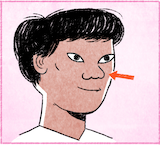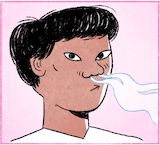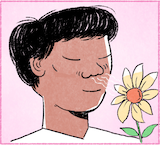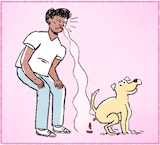



นี้คืออี่หยัง นี้คือดัง อันนี้คือดังของคน ดังมันเป็นอะวัยยะวะของคน เป็นอะวัยยะวะในล้างกายของคนเฮานี้หละ
ดังเอาไว้หายใจ ขั้นคนเฮาบ่มีดัง เฮากะหายใจบ่ได้ เพาะสะนั้นแล้ว ทุกคนต้องมีดัง หลือสัดทุกโตต้องมีดัง
ขั้นบ่มีดัง กะหายใจบ่ได้ หลือบ่สามาดดมกิ่นอี่หยังได้เลย
ดังสิอยู่ส่วนหน้าของเฮา อยู่เทิงใบหน้า อยู่หม้องใบหน้าของเฮา อยู่เทิงปาก หลืออยู่ใต้ตาของเฮา
หัวของเฮานี้ มีอะวัยยะวะใดแน่ มีอันอื่นอีกบ่ กะมีอยู่ มีหูพ้อม มีปาก มีตา มีคิ้ว มีคาง มีผม มีหัว มีหน้าผาก มีแก้ม มีอีกหลายสิ่งหลายอย่างที่อยู่เทิงใบหน้าของเฮา
แต่ละอย่างกะใซ้งานคนละแบบ อย่างเซ้น ปากกะเอาไว้กิน ตากะเอาไว้แนม หูกะเอาไว้ฟังเสียง หลือว่าแข้วกะเอาไว้กัดสิ่งของ หลือเอาไว้กัดกินแนวกินนั้นหละ แต่ว่าดังนี้เอาไว้หายใจ หลือดมกิ่นต่างๆ
6
เขากำลังเฮ็ดหญัง หลือเกิดอี่หยังขึ้น จักคือกัน แต่ว่าแนมเบิ่งพาบนี้แล้ว เห็นค้ายๆ ว่าเขากำลังดมกิ่นอยู่ หลือเขากำลังได้กิ่นอี่หยังบางสิ่งบางอย่าง จักเป็นกิ่นอี่หยัง แต่กะบ่ฮู้คือกัน ตอนนี้เขากำลังดมอยู่ จักว่าเขาดมแบบใด เขากำลังใซ้ดังของเขาดมกิ่นนั้นอยู่ บ่ลู้ว่ากิ่นนั้นมันมาแต่ใส สิหอมหลือสิเหม็นกะบ่ลู้คือกัน
7
เขากำลังเฮ็ดหญัง เขากำลังดมกิ่น
ตอนนี้เขากำลังดมกิ่นอยู่ เขาดมกิ่นดอกไม้อยู่ มีดอกไม้อยู่หน้าของเขา จักบ่ลู้ว่าเป็นดอกอี่หยัง ดอกมันดอกบักใหญ่หนึ่ง
ดอกสีเหลียง หลือดอกสีส้ม ใจกางของมันเป็นสีส้ม เกสอนหลือดอกของมันกะเป็นสีเหลียง บานออกใบดอกบักใหญ่หนึ่ง ใบมันกะสีเขียว เขียวจึ่งคื่งอยู่
ตอนนี้เขากะกำลังดมอยู่ คือสิหอมหลาย ได้กิ่นดอกไม้แล้วเขาคือสิสดซื้น เขาคือสิมีความสุขหลาย ที่ได้ดมกิ่นดอกไม้ เพาะว่ากิ่นดอกไม้มันคือสิหอมคัก
แล้วตอนนี้เขากะกำลังหลับตาพ้อม เขาคือสิมีความสุขหลาย
8
เขากำลังเฮ็ดหญัง เขากำลังตกใจ เขากำลังได้กิ่นขี้หมา
มีหมาโตหนึ่ง กำลังขี้อยู่ ขี้ออกบักหลายหนึ่ง หมาโตสีเหลียง มันคือสิมีความสุขหลาย มันได้ขี้ มันกำลังขี้ออกไป แล้วพุซายคนนี้กะญ่างมาพอดี พอพุซายคนนี้เห็น กะตกใจ แล้วกะได้กิ่นขี้หมานี้
เขาคือสิใจฮ้ายคัก คือสิสูนแฮง เพาะว่าเขาได้กิ่นขี้หมา กิ่นขี้หมานี้คือสิเหม็นคัก คือสิเหม็นกะด้อกะเดี้ย คือสิเหม็นคักเติบ
Link to overview page
Link to dictionary
| Isaan | Pronunciation | Tones | Thai | English/Notes |
|---|---|---|---|---|
| นี้ | ni: | HF | นี้ | 1. this 2. here |
| คือ | khʉ: | HR | คือ | 1. to be, to resemble, like, as 2. why {บักหล้าคือบ่เก็บโต่ะแน่ = [addressing a young boy] Why haven't you cleared the table?} |
| อี่หยัง | i:-yaŋ | H-M | อะไร | 1. what {นี้คืออี่หยัง = What is this?} {มื้อนี้เจ้าเฮ็ดอี่หยัง = What are you doing today?} {กินเข้างายกับอี่หยัง = What did you have for breakfast?} 2. something, anything, (in negations) nothing {บ่ต้องเฮ็ดอี่หยังอีกเลยนอกจากใส่ปุย = [we] don't need to do anything besides adding fertilizer} |
| ดัง | daŋ | M | จมูก | nose |
| อัน | an | M | อัน | 1. thing, object 2. general clf. for objects |
| ของ | khɔ:ŋ | M | ของ | of, belonging to |
| คน | khon | HR | คน | person, people |
| มัน | man | HR | มัน | it (also used to refer to people) |
| เป็น | pen | M | เป็น | 1. to be, to exist 2. to be able to 3. to suffer, sth. happens to 4. เป็นหญัง[...]คือ in initial position: why? {เป็นหญังเขากะคือแปงฟัน = Why is he brushing his teeth?} {เป็นหญังเคี่ยงบินมันคือสิตก = Why is the airplane falling down?} |
| อะวัยยะวะ | a-wai-ya-wa | M-HR-M-H | อวัยวะ | organ, body part |
| ใน | nai | HR | ใน | in, within |
| ล้างกาย | la:ŋ-ga:i | HF-M | ร่างกาย | body |
| เฮา | hao | HR | เรา | 1. personal pronoun: we 2. personal pronoun: I |
| นี้หละ | ni:-la | HF-M | นี่แหละ | auxiliary for emphasis at the end of a phrase |
| เอา | ao | M | เอา | to take, to give {เขากำลังเอาก่องไปซั่ง = he's taking the boxes to weigh them} {หมอกำลังเอายาให้คนป่วยกิน = the doctor is giving medicine to the patient} {เอาไว้ถ้า = is for, is used for, has the purpose of} |
| ไว้ | wai | HF | ไว้ | 1. to keep, to put, to place, to retain, to save, to reserve {เขาเอาหัวของเขาไว้ใส = Where does she put her head?} {หมาสิเลี้ยงไว้บ้าน = dogs are kept/raised in the house} {ไก่เลี้ยงไว้ในคอก = chicken are kept/raised in a coop} {หน้ามันบังไว้ = the face is covered/not visible} {เขาเอาโทละสับวางไว้หู = he holds the phone to his ear} 2. for {นาลิกาปุกมีไว้เฮ็ดหญัง = What is an alarm clock for?} {หม้อเอาไว้เฮ็ดแนวกิน = a pot is used to make food} {ก่องเอาไว้เฮ็ดหญัง ก่องเอาไว้ใส่ของ = What is the box for? It's for putting in stuff.} Notes: see also ไว้ถ้า |
| หายใจ | ha:i-jai | M-M | หายใจ | to breathe |
| ขั้น | khan | LF | เมื่อ | when, if |
| บ่ | bɔ: | H | ไม่ | 1. no, not 2. question particle, transforming a statement into a question Notes: spelling exception in line with common usage on social media |
| มี | mi: | HR | มี | 1. to have 2. there is |
| กะ | ga | M | ก็ | 1. then, consequently 2. also |
| ได้ | dai | HF | ได้ | 1. can 2. to get, to obtain 3. before verb: indicating past tense 4. บ่ได้ + verb: not |
| เพาะสะนั้นแล้ว | phɔ-sa-nan-lɛ:o | H-M-HF-HF | เพราะฉะนั้นแล้ว | therefore, for that reason, consequently Notes: pronunciation: also realized as เพาะฉะนั้น |
| ทุก | thuk | H | ทุก | every Notes: also pronounced ทุ as in ทุมื้อๆ = everyday, always |
| ต้อง | tɔŋ | HF | ต้อง | to have to, must |
| หลือ | lʉ: | M | หรือ | or |
| สัด | sat | M | สัตว์ | animal |
| โต | to: | M | ตัว | 1. body, self 2. clf. for animals, characters/letters/consonants, appliances, clothes (e.g., pairs of trousers, shirts) |
| สามาด | sa:-ma:t | M-HF | สามารถ | can, to be able |
| ดม | dom | M | ดม | to smell, to sniff {ดมกิ่นดอกไม้ = to smell the scent of flowers} |
| กิ่น | gin | H | กลิ่น | smell, scent, odour {ดมกิ่น, ได้กิ่น = to smell} |
| เลย | lə:i | HR | เลย | 1. futher on, beyond, past {เข็มน้อยเลยเลขสิบสองไป = the minute hand has passed number twelve} 2. too much 3. at all 4. definitively 5. completely, utterly |
| สิ | si | M | จะ | future tense auxiliary {เขากำลังสิตื่น = he's about to wake up} {สิไปตะหลาด = [I'm] going to the market} |
| อยู่ | yu: | H | อยู่ | 1. to be (located) at 2. yet, still 3. auxiliary indicating continuous or progressive action {ทอดปาอยู่ในกะทะ = (in the process of) frying a fish in the pan} {แม่กำลังเมี้ยนเฮียนอยู่ = mother is cleaning/tidying up the house} |
| ส่วน | su:an | H | ส่วน | part, portion |
| หน้า | na: | LF | หน้า | 1. front {ปะตูหน้า = front door} 2. face {เขากำลังล้างหน้า = he's washing his face} 3. auxiliary: conditional tense {เขาหน้าสิเป็นพุบ่าวพุสาวกัน = they are probably groom and bride} {กะหน้าสิส้มอยู่ = it's likely to be sour} 4. season {หน้าฮ้อน = hot season} 5. page 6. clf. for pages {เฮาอ่านฮอดหน้านั้นแล้ว = we've read until this page} |
| เทิง | thə:ŋ | HR | บน | 1. on, on top of, at, in {เทิงโต่ะ = at/on the table} {กบมันนั่งอยู่เทิงใบบัว = the frog is sitting on the lotus leaf} {เทิงท้องฟ้า = in the sky} {มันแล่นอยู่เทิงลาง = [the train] runs on rails} {มีคนนั่งอยู่เทิงลดสามล้อสามคน = there are three people sitting in the tuk tuk} 2. up, upward Notes: pronunciation: also realized as ทัง |
| ใบหน้า | bai-na: | M-LF | ใบหน้า | face |
| หม้อง | mɔŋ | LF | ที่, แห่ง, บริเวณ | 1. place, area {หลายที่หลายหม้อง = in many places} {หม้องใดหม้องหนึ่ง = some place} 2. clf. for places |
| ปาก | pa:k | LF | ปาก | mouth |
| ใต้ | tai | HF | ใต้ | under, beneath, below |
| ตา | ta: | M | ตา | eye {เขามีตาสองข้าง = he's got two eyes} {หลับตา = to close one's eyes} |
| หัว | hu:a | M | หัว | 1. head 2. clf. for onions, bulbs of garlic |
| ใด | dai | M | ใด | 1. which, that one which, what, how {เขานั่งแบบใด เขานั่งขดตะหมาดอยู่ = How is he sitting? He's sitting cross-legged.} {ตอนใด = when?} 2. whichever, whoever {หม้องใดหม้องหนึ่ง = some place, somewhere} {ขั้นเฮาอยากตื่นญามใด เฮากะตั้งเวลาปุกญามนั้น = If we want to get up at a certain time, we set the alarm to that time} Notes: sentence-final often with a marked rising tone |
| แน่ | nɛ: | H | แน่, บ้าง | 1. some, somewhat 2. final particle, used to ask for examples (similar to Thai บ้าง at the end of a question) {หม้อใซ้เฮ็ดอี่หยังได้แน่ = What (different things) can a pot be used for?} {น้ำอัดลมซื้อได้อยู่ใสแน่ = Where/in which places can one buy soft drinks?} 3. final particle, when giving examples {มีเทิงส้งแน่ มีเสี้ยแน่ มีเกิบแน่ = there are trousers, shirts, shoes etc.} 4. final particle, used to give a command {ไปปิดหน้าต่างให้แน่ = Close the window!} 5. final particle, acting as an intensifier, especially in the pattern ... คัก ... แน่ {สูงคักสูงแน่ = very high} {ญ้องเฮาคัก ญ้องเฮาแน่ = [he's] praising me a lot} |
| อื่น | ʉ:n | H | อื่น | other |
| อีก | i:k | LF | อีก | 1. more, again 2. other, another |
| หู | hu: | M | หู | 1. ear 2. opening, hole, e.g., the hole a needle has to insert the thread 3. handle which has a hole, e.g., of a cup or pot |
| พ้อม | phɔ:m | HF | พร้อม | at the same time, also, too {มีตะเว็นพ้อม = the sun's out, too} {กะทะมีด้ามพ้อม = the pan has also a handle} |
| คิ้ว | khiu | HF | คิ้ว | eyebrow |
| คาง | kha:ŋ | HR | คาง | chin |
| ผม | phom | M | ผม | hair |
| หน้าผาก | na:-pha:k | LF-LF | หน้าผาก | forehead |
| แก้ม | gɛ:m | HF | แก้ม | cheek |
| หลายสิ่งหลายอย่าง | la:i-siŋ-la:i-ya:ŋ | M-H-M-H | หลากหลาย, มากมาย, หลายอย่าง | varied, various, several (kinds etc.) |
| ที่ | thi: | H | ที่ | 1. that, which {คนที่ยืนอยู่ฝั่งขวา = the person which is standing on the right = the person standing on the right} {เว้าคำที่บ่สุพาบ = to speak words which are impolite = to speak impolitely} 2. for ordinal numbers {ที่สาม = third} |
| แต่ละ | tɛ:-la | H-H | แต่ละ | each {มือแต่ละข้างกะสิมีห้านิ้ว = each hand has five fingers} {แต่ละมื้อๆ = each day} |
| อย่าง | ya:ŋ | H | อย่าง | type, kind, sort, category |
| ใซ้งาน | sai-ŋa:n | HF-HR | ใช้งาน | to use, to put to use |
| คนละ | khon-la | HR-H | คนละ | different, in a different manner {ไก่กับหมา เลี้ยงคนละแบบ = chicken and dogs are raised differently} {อยู่คนละปะเทด = [they] are in different countries} {คนละแบบ = different(ly), in a different manner} |
| แบบ | bɛ:p | LF | แบบ | 1. example, model, kind 2. style, form, pattern, design |
| อย่างเซ้น | ya:ŋ-sen | H-HF | อย่างเช่น | for example, such as, like Notes: pronunciation: also realized as อย่างเช้น |
| กิน | gin | M | กิน | to eat, to consume, to use |
| แนม | nɛ:m | HR | มอง | to look, to glance, to stare {เขากำลังยืนแนมก้อนหินอยู่ = he's standing and looking at the stone/rock} {ข้างหนึ่งแนมเห็น อีกข้างหนึ่งแนมบ่เห็น = [we] see one side, [we] can't/don't see the other side} |
| ฟัง | faŋ | HR | ฟัง | to listen, to hear |
| เสียง | si:aŋ | M | เสียง | 1. sound, noise 2. tone, voice |
| ว่า | wa: | H | ว่า | 1. that, as {คำว่า X = the word X} 2. to say |
| แข้ว | khɛ:o | LF | ฟัน | tooth {หมามันมีแข้ว = the dog has teeth} |
| กัด | gat | M | กัด | to bite |
| สิ่งของ | siŋ-khɔ:ŋ | H-M | สิ่งของ | thing, object |
| แนวกิน | nɛ:o-gin | HR-M | อาหาร | food {เฮ็ดแนวกิน = to prepare food} {ตำบักหุ่งเนี้ยกะสิเป็นแนวกิน = papaya salad is (a kind of) food} |
| นั้นหละ | nan-la | HF-M | นั่นแหละ | auxiliary for emphasis at the end of a phrase |
| แต่ว่า | tɛ:-wa: | H-H | แต่ว่า | 1. but 2. only {ฮู้แต่ว่าเขายืนอยู่พุเดียว = I only know that he's standing there by himself} |
| ต่างๆ | ta:ŋ-ta:ŋ | H-H | ต่างๆ | different, various |
| เขา | khao | M | เขา | personal pronoun: he, she |
| กำลัง | gam-laŋ | M-HR | กำลัง | auxiliary indicating continuous or progressive action |
| เฮ็ด | het | H | ทำ | to do, to make |
| หญัง | ɲaŋ | M | อะไร, เป็นหญัง = ทำไม | 1. what {เขากำลังเฮ็ดหญัง = What is he doing?} {ธูปเอาไว้เฮ็ดหญัง = What are incense sticks for?} 2. something, anything, (nothing) 3. เป็นหญัง[...]คือ in initial position: why {เป็นหญังเขาคือใส่บักพิกลงไปในกวยเตียว = Why is he putting chili in [his] noodle soup?} {เป็นหญังหน้าต่างมันคือเปิด = Why is the window open?} {เป็นหญังมันคือมีควนไฟ = Why is there smoke?} |
| เกิด | gə:t | LF | เกิด | 1. (often together with ขึ้น) to happen, to arise, to take place {เกิดอี่หยังขึ้น = what is happening?} {บ่มีหญังเกิดขึ้น = nothing's happening} 2. to be born 3. to grow {หนวดกะคือสิเกิดอยู่ใต้ดัง = a moustache grows below the nose} |
| ขึ้น | khʉn | LF | ขึ้น | 1. to go up, to increase 2. sun: to rise {ตะเว็นกำลังขึ้น = the sun is rising} 3. more 4. bus/train etc.: to get on, to board {พุโดยสานขึ้นลดไฟเบิดแล้ว = all passengers have boarded the train} |
| จัก | jak | M | จัก | 1. answer to a question: [I] don't know, don't know exactly, [I'm] not sure {พุซายคนนี้เขาเถ้าไป่ จัก จักเถ้าหลือบ่เถ้า เบิ่งบ่ค่อยออก = Is this man here already old? I don't know. I can't see clearly whether he's old or not.} {เขาเว้ากันอยู่ใส จักคือกัน = Where are they talking? I don't know either.} 2. exact(ly), what exactly {จักต้มอี่หยังกะบ่ฮู้ = I don't know what (exactly) he is cooking} {บ่ลู้คือกันจักปาอี่หยัง = I don't know either what kind of fish this is} 3. how much/many? {ต้นไม้มีจักต้น = How many trees are there?} {ตอนนี้จักโมงแล้ว = What time is it now?} {มือของเฮานี้สิมีจักนิ้ว = How many fingers do our hands have?} 4. a bit, a little bit {จักหน่อย/จักหน่อยหนึ่ง = a bit, a little bit} |
| คือกัน | khʉ:-gan | HR-M | เหมือนกัน | 1. also, likewise, similarly {ยินดีที่ได้ฮู้จักคือกันคับ = Nice to meet you too!} 2. in negative sentences: either {บ่ลู้คือกัน = I don't know either} {จักคือกัน = I don't know (either)} |
| แนมเบิ่ง | nɛ:m-bəŋ | HR-H | มองดู | 1. to look at 2. to watch |
| พาบ | pha:p | HF | ภาพ | 1. picture, photo 2. clf. for pictures, photos |
| แล้ว | lɛ:o | HF | แล้ว | 1. finished 2. already 3. and then, and next (especially แล้วกะ) 4. auxiliary for past tense |
| เห็น | hen | M | เห็น | to see |
| ค้าย | kha:i | HF | คล้าย | to resemble, to be similar, to be alike {ทัพพีเป็นค้ายๆ กับซ้อน = a ladle is similar to a spoon} |
| บางสิ่งบางอย่าง | ba:ŋ-siŋ-ba:ŋ-ya:ŋ | M-H-M-H | บางสิ่งบางอย่าง | something, anything |
| แต่ | tɛ: | H | แต่ | 1. but {แต่บ่ต่างกันหลาย = but not very different} {แต่บ่ลู้ว่าเขาญ่างมาแต่ใส = but [I] don't know where he's coming from, see also: แต่ว่า} 2. only {ตอนนี้มีแต่ขี้ฝ้า = now there are only clouds} |
| ฮู้ | hu: | HF | รู้ | 1. to know 2. to understand Notes: equivalent to ลู้ |
| ตอนนี้ | tɔ:n-ni: | M-HF | ตอนนี้ | now |
| ใซ้ | sai | HF | ใช้ | to use |
| นั้น | nan | HF | นั้น | that, there |
| ลู้ | lu: | HF | รู้ | 1. to know 2. to understand Notes: equivalent to ฮู้ |
| มา | ma: | HR | มา | 1. to come 2. auxiliary expressing action towards the present or focal time {กะคุเฮ็ดมาจากอี่หยัง = What is the bucket made of?} {แล้วเขากะเก็บเงินจากพุนั้นมา = and then she takes the money of that person} |
| แต่ใส | tɛ:-sai | H-M | จากไหน | where from? |
| หอม | hɔ:m | M | หอม | to smell good, to be fragrant |
| เหม็น | men | M | เหม็น | to smell, to stink |
| ดอกไม้ | dɔ:k-mai | LF-HF | ดอกไม้ | flower |
| ดอก | dɔ:k | LF | ดอก | flower |
| บัก | bak | M | 1. intensifier before adjectives {ปาโตบักใหญ่ = a (very) large fish} 2. prefix in front of fruits and vegetables {บักแตงโม = watermelon} 3. can be used as a reference for a male person of the same or younger age {บักอันนี้ = this lad} |
|
| ใหญ่ | ɲai | H | ใหญ่ | large, big |
| หนึ่ง | nʉŋ | H | หนึ่ง | 1. one 2. after adjective: intensifier {บักคักหนึ่ง = very much} {อันบักใหญ่หนึ่ง = very large}, or attenuates the meaning {กะดาดมันแผ่นน้อยๆ หนึ่ง = the piece of paper is [relatively] small} |
| สี | si: | M | สี | 1. color 2. colored pencil, crayon |
| เหลียง | li:aŋ | M | เหลือง | yellow |
| ส้ม | som | LF | ส้ม | 1. fruit: orange 2. color: orange |
| ใจกาง | jai-ga:ŋ | M-M | ใจกลาง | center |
| เกสอน | ge:-sɔ:n | M-M | เกสร | pollen |
| บาน | ba:n | M | บาน | to open, to bloom, to flower |
| ออก | ɔ:k | LF | ออก | 1. to go out, to leave 2. out |
| ใบดอก | bai-dɔ:k | M-LF | ใบดอก | petal |
| ใบ | bai | M | ใบ | 1. leaf {ต้นไม้มีใบสีเขียว = the tree has green leaves} 2. banknote {เทิงมีใบพ้อม เทิงมีเหลียนพ้อม = there are notes as well as coins} 3. clf. for leaves, bank notes, helmets, bowls, jars, pots, boxes {ใบบัว = lotus leaf} {ก่องใบน้อย = a small box} {หม้อใบนี้มีฝาพ้อม = the pot here has a lid, too} {ถ้วยใบสีแดง = a red bowl} |
| เขียว | khi:ao | M | เขียว | green |
| จึ่งคื่ง | jʉŋ-khʉ:ŋ | H-H | เขียวขจี | color: very green {เขียวจึ่งคื่ง = very green} Notes: possible that this intensifier should rather be used with red (สีแดง), not green (สีเขียว) |
| หลาย | la:i | M | เยอะ, มาก | many, much, very |
| สดซื้น | sot-sʉ:n | M-HF | สดชื่น | fresh, refreshed Notes: pronunciation: also realized as สดชื้น |
| ความสุข | khwa:m-suk | HR-M | ความสุข | happiness |
| เพาะว่า | phɔ-wa: | H-H | เพราะว่า | because |
| คัก | khak | H | intensifier: very, very much | |
| หลับ | lap | M | หลับ | 1. to sleep {นอนหลับ = to sleep (see separate entry)} 2. to close (the eyes) {หลับตา = to close one's eyes} |
| ตกใจ | tok-jai | M-M | ตกใจ | 1. startled, surprised 2. frightened |
| ขี้ | khi: | LF | ขี้ | 1. excrement, shit {ขี้หมา = dog shit} 2. to defecate, to shit Notes: prefix in front of nouns like ขี้ดิน, ขี้ตม, ขี้ผึ้ง, ขี้ฝ้า and verbs/adjectives like ขี้มึน |
| หมา | ma: | M | หมา | dog |
| ไป | pai | M | ไป | 1. to go 2. auxiliary indicating action extending into the future |
| พุซาย | phu-sa:i | H-HR | ผู้ชาย | man, male |
| ญ่าง | ɲa:ŋ | H | เดิน | to walk {เขากำลังญ่างเว้ากัน = they are walking and talking} {ลูกเป็ดญ่างไปนำแม่เป็ด = the ducklings are [walking] following their mother} {เขากำลังญ่างข้ามสะพาน = she's walking over the bridge} {เขาสิญ่างไปใส = Where is he going?} |
| พอดี | phɔ:-di: | HR-M | พอดี | 1. to fit well 2. appropriate, just enough, just right {กะจกบานบ่ใหญ่ กะจกบานพอดี = not a large window, just right} {พอดีมือของเฮา = just right for his hand} 3. just in time, at the right moment, just this moment {แล้วพุซายคนนี้กะญ่างมาพอดี = and the man has come just now} |
| พอ | phɔ: | HR | พอ | 1. just when, just after, as soon as 2. enough, adequate |
| ใจฮ้าย | jai-ha:i | M-HF | โกรธ, อารมย์เสีย | irritated, annoyed |
| สูน | su:n | M | โกรธ | angry |
| แฮง | hɛ:ŋ | HR | แรง | 1. strong {ลมกำลังพัดแฮงอยู่ = to wind is blowing strongly} 2. loud {เสียงแฮง = loud} 3. strength, power |
| กะด้อกะเดี้ย | ga-dɔ:k-ga-di:a | M-HF-M-HF | มากมาย, มากเกินไป | intensifier: very, very much |
| เติบ | tə:p | LF | intensifier: very, much {เว้ากันโดนเติบ = to talk a long time} |